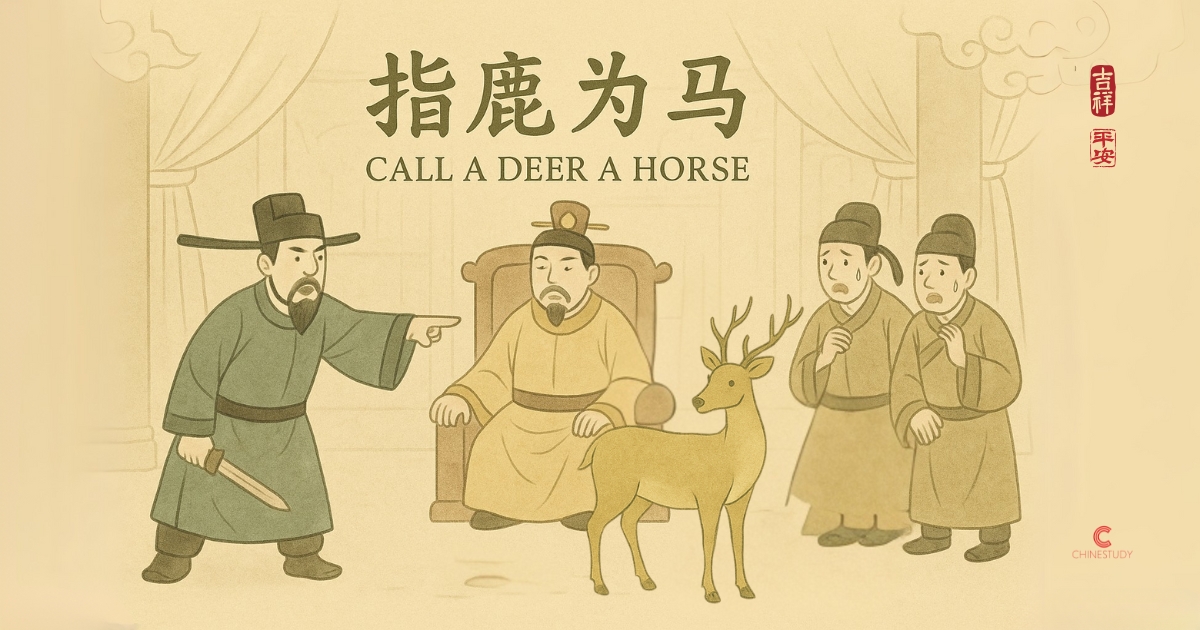🦌 指鹿为马 zhǐ lù wéi mǎ – When Power Twists the Truth

🔍 What It Means
指鹿为马 (zhǐ lù wéi mǎ) literally means “to point at a deer and call it a horse.”
Word-for-word:
- 指 (zhǐ) – to point at
- 鹿 (lù) – deer
- 为 (wéi) – as / to be
- 马 (mǎ) – horse
It describes someone who twists the truth on purpose, or forces others to accept a lie — especially to test loyalty or control people.
In English, it’s similar to:
- 🌀 “Gaslighting”
- 🧠 “Calling black white”
- 👑 “The emperor’s new clothes”
🏺 Where It Comes From
This idiom comes from a real story during the Qin Dynasty.
A powerful official named Zhao Gao wanted to test who would obey him.
He brought a deer to the emperor and said,
“Your Majesty, here is a fine horse.”
The emperor laughed,
“That’s clearly a deer — not a horse.”
Then Zhao Gao turned to the other officials and asked,
“What do you think?”
Some officials, afraid to disagree, nodded and said,
“Yes… it’s a horse.”
Others stayed silent or told the truth — and were later punished.
This was Zhao Gao’s way to test loyalty — to see who would follow him, even when they knew he was lying.
💬 How to Use It
Use 指鹿为马 when someone intentionally distorts the truth, and forces others to go along with it — often in politics, manipulation, or social pressure.
- ❌ It’s a negative idiom — serious and critical.
- 🗣 Often used when someone powerful twists facts and expects others to follow.
🎯 Real Examples
1. 他明知道是错的,还要我们说对,简直是指鹿为马。
- Tā míng zhīdào shì cuò de, hái yào wǒmen shuō duì, jiǎnzhí shì zhǐlùwéimǎ.
- 👉🏼 He knows it’s wrong but still wants us to say it’s right — that’s exactly calling a deer a horse.
2. 有时候,一些人为了讨好上级,不敢说真话,成了现代的“指鹿为马”。
- Yǒu shíhòu, yìxiē rén wèile tǎohǎo shàngjí, bù gǎn shuō zhēnhuà, chéngle xiàndài de “zhǐlùwéimǎ.”
- 👉🏼 Sometimes, people flatter their boss and avoid telling the truth — a modern-day version of “calling a deer a horse.”
⚠️ Common Mistakes (Watch Out!)
- ❌ Mistake: Using this idiom for innocent misunderstandings.
- ✅ Correct: This idiom involves intentional lying or testing others’ loyalty — not simple confusion.
💡 Memory Tip

Imagine someone pointing at a deer and confidently saying:
“This is a horse.”
And others nod in fear.
That’s 指鹿为马 — truth doesn’t matter, only power.
✍🏻 Interactive Practice
Translate this sentence into English:
- 他用指鹿为马的方式来控制下属,谁不同意就被排挤。
Answer:
He used the “call a deer a horse” method to control his subordinates — anyone who disagreed was pushed out.
🌟 Final Thoughts
指鹿为马 reminds us that truth can be twisted — and people often go along with it to protect themselves.
But in the long run, pretending a deer is a horse only helps the powerful…
and hides the real danger. 🦌➡️🐎
🧠 In any language, truth needs courage — and 指鹿为马 shows what happens when fear takes over.
👉 Stay tuned for the next idiom in this series!
Thank you for subscribing!
Have a great day!